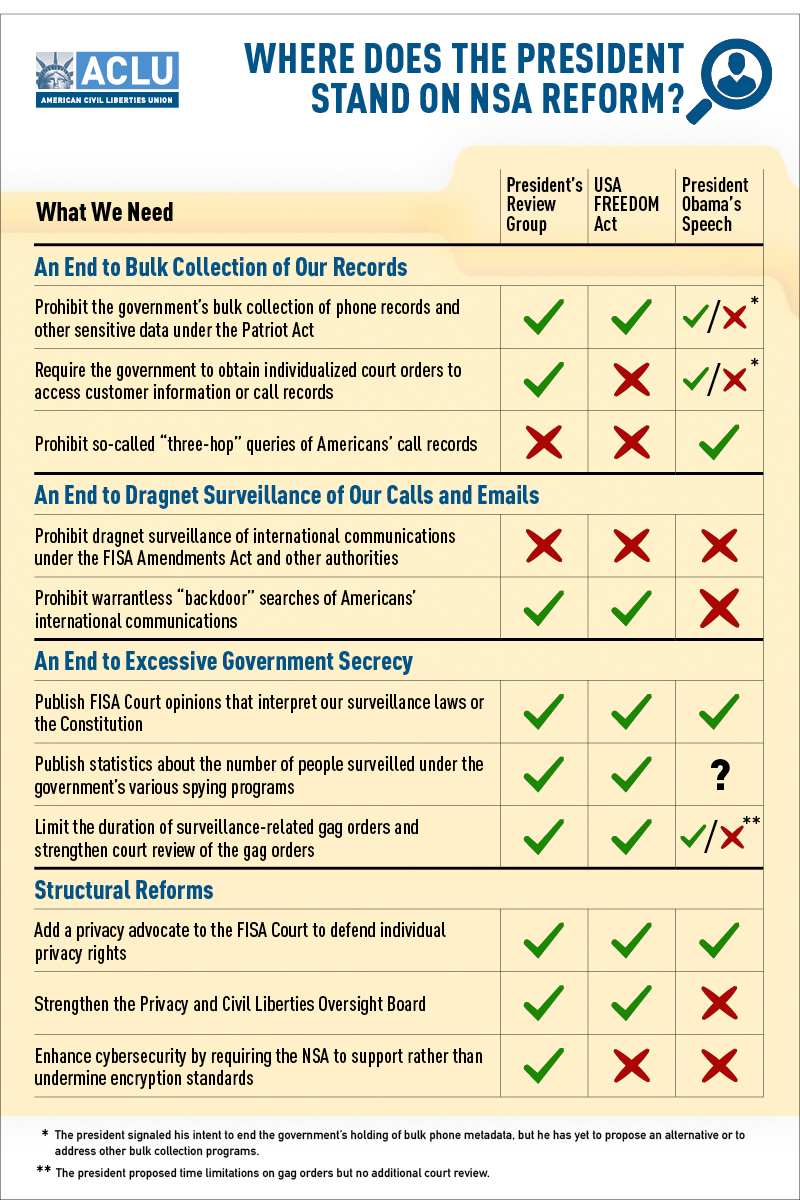
- As Representative Justin Amash said after President Obama’s speech, “Nothing the President said today will end the unconstitutional invasion of Americans' privacy.” The end of the illegal and unwarranted, dragnet surveillance of Americans’ communications will come only when the courts and congress act to stop it.
- We cannot leave the reform of executive powers up to the executive. Any reforms advanced by President Obama can be reversed with the stroke of a pen by the next administration. We need to ensure that whatever law reforms occur as a result of the Snowden disclosures are firmly entrenched in statute and legal precedent. Executive action, even if it is a marginal step in the right direction, is not close to sufficient.
- Contrary to some reports, President Obama did not advocate putting an end to the dragnet phone surveillance program, which the government claims is authorized under Section 215 of the USA Patriot Act. In fact, he suggested he is open to figuring out a way for a third party to hold onto this information—that is, records of every single phone call made in the United States, including every call you made today and over the past 5 years. President Obama said that the NSA and the FBI may be required to get a court order to search this database in the future, but presumably this would happen in the government’s “foreign” intelligence secret court. This is not acceptable. The only way to ensure that Americans’ privacy is not abused by the dragnet pooling of our extremely revealing metadata records is to end the dragnet. In the vast majority of circumstances, the government should only be permitted to collect records pertaining to people against whom officials have specific evidence of wrongdoing, and with judicial approval.
- During his speech, the President repeatedly claimed that the phone records surveillance program protects public safety, and is a critical tool that intelligence agencies need in order to ensure national security. That is demonstrably false. The phone records program has not stopped one single terrorist plot, as a federal judge and even the President’s hand-picked NSA review group confirmed. Mass surveillance is not about security, it is about power and control. The US government does not need to keep records on all law-abiding citizens in order to trace the communications patterns of suspected terrorists.
- President Obama did not meaningfully address the fact that the US government is obtaining the content of Americans’ communications without warrants. Various programs disclosed by Edward Snowden confirm our worst fears about how the intelligence agencies conduct warrantless wiretapping under the FISA Amendments Act. Other Snowden disclosures gave us evidence that the NSA is warrantlessly spying on Americans’ communications under various programs authorized by executive order. Nothing in the President’s plan would stop the NSA from stealing data from US internet companies, or tapping into the fiber optic cables that connect the world and carry our private communications and transactions.
- The President did not object to the use of information derived without warrants or through dragnet surveillance programs in routine criminal trials in the United States. Secret evidence is incompatible with a free society. Congress must act to ensure that information collected in warrantless, so-called ‘national security’ surveillance is not secretly deployed in criminal trials in the United States. Every person has a right to a hearing of the full evidence against them.
- For that reason, it was scary to hear President Obama—during a speech about the NSA’s near God-like surveillance powers—describe how information sharing arrangements between federal and state and local governments have improved since 9/11. State and local government law enforcement agencies should not be given access to information collected by the NSA for so-called ‘national security’ purposes, especially if the evidence of this trickle-down is never revealed to the target.
- President Obama did not address the fact that, under his watch, the intelligence establishment has purposefully weakened internet security measures that billions of people and thousands of businesses rely on to protect the security of their digital communications. The US government should not undermine strong encryption, which serves as the backbone of a secure, free internet. Endangering encryption harms personal privacy, business, and the economic security of US corporations and individuals.
- The administration’s proposals to ‘reform’ the use of secret subpoenas called ‘National Security Letters’ fall flat. President Obama rejected his review group’s recommendation to strengthen oversight by requiring a judge to review NSLs. He also made it sound like limiting the gag order attached to the secret subpoenas was his idea, when in fact a federal court already ruled the gag provision unconstitutional.
- During President Obama’s speech, he made it sound as if the NSA has not abused its digital communications dragnet. That is false.
The only thing that will rein in the unaccountable, near-totalitairan power of the US national security state is action by we the people, the courts, and the congress. The first step is passing the USA Freedom Act. Take action now.
UPDATE: One more quick thing I forgot to note. While the Citizens' Committee to Investigate the FBI robbed the Media, PA office in 1971, exposing COINTELPRO to the American public, the really meaningful reforms to rein in the out of control surveillance state didn't occur until years later. That's to say: don't be discouraged if we don't win right away. These struggles take time. Certainly, undoing the most powerful surveillance apparatus the world has ever seen is no small task. But a free future depends on it.
